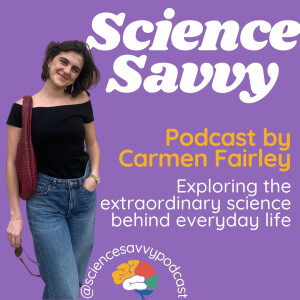
Saturday Jan 04, 2025
The Science of Friendship: Giggles, Bonding, and Learning
In this episode of Science Savvy, I’m joined by my best friend of ten years, Dasha, to explore the science behind long-term friendship. With warmth, laughter, and a healthy dose of evidence-based insight, we look at how your brain syncs up with your closest companions, why oxytocin makes you feel safe and connected, and how staying close to your friends can actually support your physical health and longevity.
We discuss how friendship shapes the brain, buffers stress, and even extends lifespan. Whether you're curious about how social bonds work or simply love your bestie and want to know why it matters, this episode is packed with heart and science.
Science Savvy is about uncovering the biology behind the relationships, habits, and emotions that define our lives. If you're ready to understand how your friendships literally change your brain, this episode is for you.
Further reading and references:
Dunbar, R. I. M. (2018). Friends: Understanding the Power of Our Most Important Relationships. Little, Brown Spark.
Parkinson, C., Kleinbaum, A. M., & Wheatley, T. (2018). Similar neural responses predict friendship. Nature Communications.
Holt-Lunstad, J., Smith, T. B., & Layton, J. B. (2010). Social relationships and mortality risk: A meta-analytic review. PLoS Medicine.
Lieberman, M. D. (2013). Social: Why Our Brains Are Wired to Connect. Crown Publishers.
Cohen, S., & Wills, T. A. (1985). Stress, social support, and the buffering hypothesis. Psychological Bulletin.
Lunn, N. (2021). Conversations on Love. Viking.
Holt-Lunstad, J. (2018). Why social relationships are important for physical health: A systems approach to understanding and modifying risk and protection. Annual Review of Psychology.
Haslam, C., & Jetten, J. (2014). Social connectedness and health in older adults. Journal of Aging and Health.
Roberts, S. G., & Dunbar, R. I. (2011). Communication in social networks: Effects of kinship, network size, and emotional closeness. Personal Relationships.
Langan, K. A., & Purvis, J. M. (2020). Long-distance friendship maintenance: An application of expectancy violation theory and the investment model. Current Opinion in Psychology.
No comments yet. Be the first to say something!